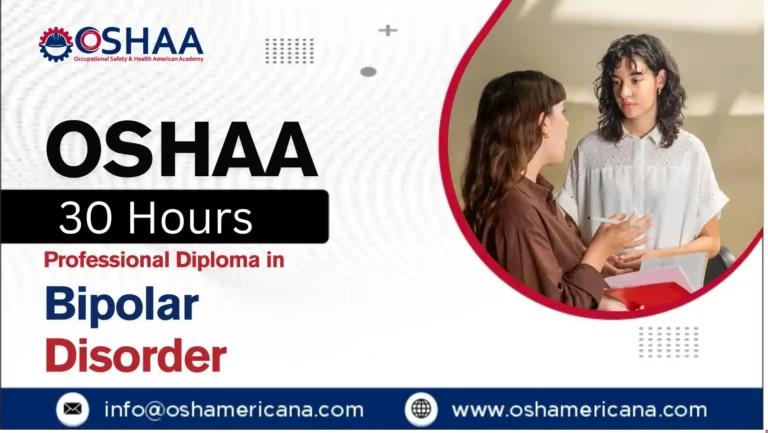In today’s healthcare environment, providing care that places the individual at the centre of their treatment is essential for both improving patient satisfaction and enhancing health outcomes. The OSHAA 30-Hours Professional Diploma in Person-Centered Care is designed to equip healthcare professionals with the knowledge and skills necessary to provide holistic, compassionate, and effective care that respects and prioritises the preferences, values, and needs of each patient.
Person-centered care is an approach that respects the individual’s preferences, needs, and values, ensuring that patients have an active role in their own care decisions. This approach not only improves patient satisfaction but can also lead to better health outcomes, increased engagement, and more meaningful interactions between healthcare providers and patients.
The OSHAA 30-Hours Professional Diploma in Person-Centered Care is designed to provide participants with the necessary tools and strategies to deliver high-quality person-centered care across a variety of healthcare settings. Throughout the course, you will explore the essential principles of person-centered care, its benefits, and the practical steps required to implement these principles effectively.
The OSHAA 30-Hours Professional Diploma in Person-Centered Care is a vital course for healthcare professionals who aim to enhance their ability to provide compassionate, personalised care. By focusing on the individual’s needs, preferences, and values, this diploma empowers you to improve patient outcomes, strengthen relationships, and contribute to a more compassionate healthcare environment. Whether you are a doctor, nurse, or allied health professional, this course will help you develop the skills and knowledge necessary to deliver high-quality, patient-centred care across a variety of healthcare settings.
OSHAA 30-Hours Professional Diploma in Person-Centered Care
Study Units
Learning Outcomes
Introduction to Person-Centered Care (2 Hours)
- Understand the core concept of person-centered care and its significance in modern healthcare.
- Recognise the benefits of adopting a person-centered approach for both patients and healthcare professionals.
- Develop an appreciation for the importance of individual patient needs, preferences, and values in care delivery.
Principles and Core Values of Person-Centered Care (5 Hours)
- Identify the key principles and values that underpin person-centered care, such as respect, dignity, and autonomy.
- Understand how these principles guide decision-making and care delivery in healthcare settings.
- Learn how to apply person-centered care principles in practice to improve patient experiences and outcomes.
Effective Communication Skills in Person-Centered Care (4 Hours)
- Develop strong verbal and non-verbal communication skills essential for person-centered care.
- Learn how to listen actively and empathetically to patients to better understand their needs.
- Improve the ability to communicate complex information in an accessible and patient-friendly manner.
Building Therapeutic Relationships with Patients (4 Hours)
- Understand the importance of building trust and rapport with patients for effective care.
- Develop strategies for creating and maintaining therapeutic relationships that are based on mutual respect and collaboration.
- Learn how to address patient concerns and provide emotional support in a way that strengthens the therapeutic relationship.
Shared Decision-Making and Care Planning (4 Hours)
- Understand the process of shared decision-making and its role in person-centered care.
- Learn how to collaborate with patients in developing care plans that align with their values and preferences.
- Gain the skills needed to facilitate patient participation in the decision-making process regarding their care.
Cultural Competence and Diversity in Person-Centered Care (5 Hours)
- Understand the importance of cultural competence in providing person-centered care to diverse patient populations.
- Learn how to recognise and respect cultural differences in patient preferences and healthcare needs.
- Develop strategies for providing care that is both culturally sensitive and tailored to individual needs.
Empathy and Compassion in Patient Interactions (3 Hours)
- Understand the role of empathy and compassion in enhancing patient care experiences.
- Develop techniques to demonstrate genuine concern for patients’ emotional and physical well-being.
- Learn how to use empathy and compassion to support patients through difficult or stressful situations.
Person-Centered Approaches in Multidisciplinary Care (3 Hours)
- Learn how to apply person-centered care within a multidisciplinary healthcare team.
- Understand the importance of collaboration and communication among healthcare providers in delivering coordinated care.
- Develop skills for ensuring that the patient’s voice is heard in team discussions and decision-making processes.
- Enhanced Patient Satisfaction – Learn how to provide care that respects and values each patient’s unique preferences, leading to improved patient satisfaction and overall care experiences.
- Improved Communication Skills – Develop effective communication techniques that foster stronger relationships with patients, ensuring that their needs and concerns are clearly understood and addressed.
- Empowered Patient Engagement – Gain the ability to actively involve patients in their own care decisions, enhancing their autonomy and encouraging greater participation in the healthcare process.
- Cultural Competence – Build the skills to understand and respect diverse cultural backgrounds, ensuring that care is personalised and appropriate for all patients, regardless of their cultural context.
- Stronger Therapeutic Relationships – Learn how to develop trust and rapport with patients, creating lasting relationships that contribute to more positive healthcare outcomes.
- Collaboration in Multidisciplinary Teams – Acquire the knowledge to implement person-centered care within multidisciplinary healthcare teams, promoting better collaboration and comprehensive care for patients.
- Practical Approaches to Care Planning – Learn how to create care plans that are tailored to the individual’s needs, ensuring that each patient receives care that aligns with their preferences, values, and goals.
- Advocacy Skills – Develop the ability to advocate for the rights and needs of patients, ensuring that their voices are heard and respected in all aspects of their care.
- Holistic and Empathetic Care – Enhance your ability to provide holistic care that takes into account the emotional, physical, and social well-being of patients, ensuring comprehensive and compassionate care.
- Career Advancement – Improve your professional credentials with a recognised qualification in person-centered care, opening up opportunities for career growth in a variety of healthcare settings.
- Evidence-Based Practices – Learn how to apply evidence-based strategies in person-centered care to ensure that your approach aligns with the latest research and best practices in the field.
By completing the OSHAA 30-Hours Professional Diploma in Person-Centered Care, healthcare professionals will be equipped with the tools and knowledge needed to provide high-quality, personalized care that meets the diverse needs of patients, resulting in better health outcomes and a more positive care experience.
The OSHAA 30-Hours Professional Diploma in Person-Centered Care is ideal for healthcare professionals who wish to enhance their ability to provide compassionate, personalised care that prioritises the individual needs and preferences of each patient. This course is suitable for:
- Doctors and Medical Practitioners – Physicians and specialists seeking to improve their communication with patients and adopt a more holistic approach to care.
- Nurses and Nurse Practitioners – Nurses working in hospitals, community settings, or primary care who aim to improve patient engagement and deliver care that respects the autonomy and dignity of each individual.
- Allied Health Professionals – Physiotherapists, occupational therapists, and other allied health professionals interested in providing patient-centred services and improving care coordination.
- Healthcare Managers and Leaders – Healthcare administrators and managers who wish to implement person-centered care principles within their teams and organisations, enhancing patient care delivery across departments.
- Social Workers and Care Providers – Professionals working in social care settings who aim to ensure that the care provided to vulnerable individuals respects their personal preferences and needs.
- Healthcare Educators – Trainers and educators in healthcare institutions who want to incorporate person-centered care models into their teaching to ensure that future healthcare professionals are well-prepared to offer quality care.
- Clinical Researchers – Those involved in healthcare research, particularly in areas related to patient care and experience, looking to expand their understanding of person-centered practices.
- Medical Students and Trainees – Individuals pursuing careers in healthcare, who want to build a strong foundation in patient-centered approaches from the early stages of their professional development.
This course is for anyone who is committed to improving the quality of care they provide by embracing a person-centered approach, ensuring patients feel respected, heard, and involved in decisions regarding their care.







